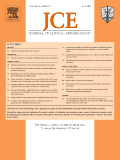
JOURNAL OF CLINICAL EPIDEMIOLOGY
Scope & Guideline
Shaping public health through rigorous research.
Introduction
Aims and Scopes
- Methodological Innovations:
The journal emphasizes novel methodological approaches in clinical epidemiology, including statistical techniques, bias assessment tools, and evidence synthesis methods that enhance the quality and reliability of research findings. - Health Equity and Inclusion:
A consistent focus on health equity, diversity, and inclusion is evident, with articles exploring how these factors influence clinical research and outcomes, ensuring that underrepresented populations are considered in epidemiological studies. - Evidence-Based Guidelines:
The journal publishes research related to the development and evaluation of clinical practice guidelines, particularly those utilizing GRADE and other evidence synthesis frameworks to inform health policy and practice. - Patient-Centered Outcomes:
Research on patient-reported outcomes and the integration of patient perspectives into clinical research is a key area, highlighting the importance of aligning health interventions with patient values and preferences. - Systematic Reviews and Meta-Analyses:
There is a significant emphasis on systematic reviews and meta-analyses, particularly those that assess the quality of reporting and methodology, as well as studies that explore the challenges and advancements in these areas. - Real-World Evidence:
The journal addresses the importance of real-world evidence in clinical decision-making, focusing on studies that utilize observational data and pragmatic trial designs to evaluate health interventions in everyday settings.
Trending and Emerging
- Use of Machine Learning and AI:
There is a rising trend in the application of machine learning and artificial intelligence in clinical epidemiology, with studies focusing on predictive modeling and data analysis techniques that enhance the understanding of complex health data. - Living Systematic Reviews and Guidelines:
The emergence of living systematic reviews and adaptive guidelines that respond to evolving evidence is gaining traction, demonstrating a commitment to real-time integration of new data into clinical practice. - Focus on Patient Engagement:
Research emphasizing patient engagement in clinical trials and guideline development is increasingly prominent, reflecting a shift towards recognizing the importance of patient perspectives in health decision-making. - Equity in Health Research:
The journal is increasingly prioritizing research that addresses health equity and disparities, with a growing body of work aimed at understanding and mitigating health inequities in diverse populations. - Real-World Data Utilization:
There is a notable increase in studies leveraging real-world data to assess the effectiveness of interventions, highlighting the importance of understanding health outcomes in community settings beyond controlled trials. - Enhanced Reporting Standards:
Emerging themes include a focus on improving reporting standards for systematic reviews and clinical guidelines, driven by the need for transparency and reproducibility in research.
Declining or Waning
- Traditional Epidemiological Studies:
There is a noticeable decline in the publication of traditional epidemiological studies that rely solely on observational designs, as the field shifts towards more innovative methodologies and real-world evidence. - Single-Outcome Studies:
Research focusing on single outcomes without considering broader implications or multiple outcomes is becoming less common, as the journal increasingly favors studies that provide comprehensive insights into health interventions. - Basic Statistical Analyses:
The prevalence of studies that employ basic statistical analyses without advanced methodological frameworks is diminishing, as the journal seeks to elevate the quality of research through more complex and nuanced statistical approaches. - Non-Clinical Contextual Factors:
There is a waning interest in studies that do not adequately integrate contextual factors (such as socioeconomic and environmental variables) into clinical research, reflecting a broader trend towards holistic approaches in epidemiology. - Descriptive Studies Without Actionable Insights:
Descriptive studies that fail to provide actionable insights or implications for clinical practice are increasingly less favored, as the journal encourages research that directly informs decision-making and guideline development.
Similar Journals
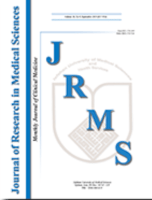
Journal of Research in Medical Sciences
Elevating medical research to new heights.Journal of Research in Medical Sciences is a leading open-access journal published by Wolters Kluwer Medknow Publications, dedicated to disseminating innovative research and advancements in the field of medicine. Established in 2005, the journal has earned a respectable Scopus rank of 205 out of 636 in General Medicine, placing it within the 67th percentile among its peers, indicative of its quality and influence in the field. With an Open Access policy adopted in 2015, the journal ensures that critical research findings are accessible to a global audience, thus fostering knowledge sharing and collaboration among researchers, medical professionals, and students. Operating out of Iran, the journal focuses on diverse aspects of medical science, offering a platform for emerging studies that span clinical practices to health-related outcomes. As a recognized publication in the Q3 quartile of medicine (miscellaneous) for 2023, the Journal of Research in Medical Sciences continues to play a pivotal role in promoting scholarly work and advancing medical knowledge, making it an essential resource for anyone invested in the evolution of healthcare and scientific inquiry.

CANADIAN JOURNAL OF SURGERY
Leading the Way in Surgical Research and DevelopmentCanadian Journal of Surgery is a prestigious peer-reviewed publication that has been a cornerstone in the fields of medicine and surgery since its inception in 1957. Published by the CMA - Canadian Medical Association, this journal is essential for researchers, clinicians, and medical students committed to advancing surgical practices and medical knowledge. With an impressive ranking within the Q2 category in both Medicine (miscellaneous) and Surgery categories for 2023, and an admirable Scopus rank of #193 out of 551 in its field, the journal continues to influence the trajectory of medical research and surgical innovation. Although it does not currently offer open access options, the Canadian Journal of Surgery emphasizes high-quality research dissemination and aims to foster dialogue and development in clinical practice. Its consistently updated content is vital for anyone seeking to remain at the forefront of surgical advancements and medical trends.
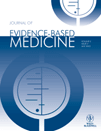
Journal of Evidence Based Medicine
Discovering the Future of Medicine, One Study at a TimeWelcome to the Journal of Evidence Based Medicine, a premier platform dedicated to advancing the field of health policy and medicine through rigorous research and scholarship. Published by WILEY, this esteemed journal, with an ISSN of 1756-5383 and E-ISSN 1756-5391, is headquartered in the United Kingdom and serves as a pivotal resource for disseminating high-quality evidence-based research. Operating within the converged years from 2008 to 2024, the journal boasts a remarkable standing, achieving a Q1 category ranking in both Health Policy and Medicine (Miscellaneous) for 2023, and ranking #12 out of 310 in the Scopus Ranks for Medicine & Health Policy, placing it in the 96th percentile. This commitment to excellence makes the journal a significant conduit for professionals, researchers, and students who seek to inform their practices with the latest evidence and foster advancements in health policy and medical practice. While currently not open access, the journal maintains a rigorous selection process to ensure the highest standards of publication, appealing to anyone intent on exploring groundbreaking studies that shape the health landscape globally.

Lancet Gastroenterology & Hepatology
Transforming patient care through innovative research.Lancet Gastroenterology & Hepatology is an esteemed journal, published by ELSEVIER INC in the United Kingdom, dedicated to advancing the fields of gastroenterology and hepatology. Since its inception in 2016, this journal has quickly established itself as a leading platform for high-quality research, evidenced by its impressive rankings as Q1 in both Gastroenterology and Hepatology for 2023. With a Scopus rank of #2 out of 167 in Gastroenterology and #2 out of 82 in Hepatology, it lies in the prestigious 99th and 98th percentiles, respectively, underscoring its significant impact within the scientific community. The journal aims to publish original research, critical reviews, and clinical studies that illuminate the latest advancements and challenges in the understanding and treatment of gastrointestinal and liver diseases. As a vital resource for researchers, healthcare professionals, and students alike, the Lancet Gastroenterology & Hepatology journal fosters the dissemination of pioneering findings and facilitates informed discussions to enhance patient care and health outcomes globally.

Systematic Reviews
Elevating clinical guidelines through comprehensive evaluations.Systematic Reviews is a leading open-access journal published by BMC, focused on the comprehensive and systematic analysis of health-related literature. Established in 2002, the journal has significantly contributed to the field of Medicine (miscellaneous) and has been recognized as a Q1 journal in the 2023 category quartiles, ranking 48 out of 398 in its field with an impressive 88th percentile on Scopus. With its open-access model initiated in 2012, Systematic Reviews ensures that vital research findings are freely available to researchers, practitioners, and students worldwide. The journal aims to publish high-quality systematic reviews that inform clinical guidelines, healthcare decisions, and policy-making, contributing to evidence-based practice in medicine. Located in the United Kingdom, it serves as an essential resource for advancing knowledge within the global health community, encouraging rigorous research methodology and facilitating the dissemination of impactful findings.
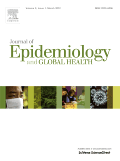
Journal of Epidemiology and Global Health
Connecting scholars and practitioners to shape the future of epidemiology.The Journal of Epidemiology and Global Health (ISSN: 2210-6006; E-ISSN: 2210-6014), published by SpringerNature, stands as a premier open-access platform in the field of epidemiology, dedicated to advancing our understanding of global health challenges since 2011. Based in Switzerland, this journal is recognized for its significant contributions to the discipline, achieving an impressive Q1 ranking in Epidemiology and positioning itself at the 88th percentile within the Scopus Medicine - Epidemiology category. With a goal to disseminate innovative research and foster dialogue among scholars, public health professionals, and students, the journal provides a rich repository of empirical studies, reviews, and theoretical contributions that address pressing epidemiological issues. Its commitment to open access ensures that vital research is freely available to the global community, thereby amplifying its impact and relevance. Researchers seeking to publish and access high-quality, peer-reviewed articles will find the Journal of Epidemiology and Global Health an invaluable resource in navigating the ever-evolving landscape of public health.

Journal of Clinical and Diagnostic Research
Driving Excellence in Clinical Research and DiagnosticsWelcome to the Journal of Clinical and Diagnostic Research, a leading open-access journal published by the PREMCHAND SHANTIDEVI RESEARCH FOUNDATION since 2007. This journal serves as a crucial platform for researchers and professionals in the fields of biochemistry, genetics, and molecular biology, with a particular focus on clinical biochemistry. The journal is recognized for its commitment to disseminating high-quality research, fostering academic dialogue, and enabling practitioners to stay at the forefront of advancements in diagnostic methods. With an ISSN of 2249-782X, the journal enhances accessibility to critical research findings and discussions, ensuring that the scientific community and interested students can engage with valuable insights. Although coverage has been discontinued in Scopus since 2018, its rankings within the clinical biochemistry domain reflect a dedicated scholarly impact that continues to influence research trajectories. We invite you to explore the wealth of knowledge presented in the Journal of Clinical and Diagnostic Research and contribute to the evolving discourse in clinical science.

HEALTH TECHNOLOGY ASSESSMENT
Empowering evidence-based decisions in health technology.HEALTH TECHNOLOGY ASSESSMENT is a prestigious open-access journal published by the NIHR Journals Library, focusing on advancing the science of health technology assessment through robust research and critical analysis in the fields of Health Policy and Medicine. Since its inception in 2001, this journal has fostered a multidisciplinary approach to evaluating health technologies, offering invaluable insights to researchers, healthcare professionals, and policymakers. With an impressive Q1 ranking in both Health Policy and Medicine (miscellaneous) for 2023, it stands at the forefront of academic discourse, reflecting a high-impact factor and an esteemed reputation within its respective categories. The journal not only publishes original research articles, but also reviews and case studies that illuminate the complexities of health technology in real-world applications. Established and based in the United Kingdom, HEALTH TECHNOLOGY ASSESSMENT strives to encourage evidence-based decision-making, making it an essential resource for anyone committed to enhancing healthcare outcomes through innovative technology assessments.
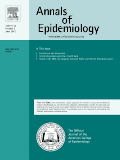
ANNALS OF EPIDEMIOLOGY
Leading the Conversation in Epidemiological StudiesANNALS OF EPIDEMIOLOGY, published by Elsevier Science Inc, stands as a leading journal in the field of epidemiology, with an impressive impact factor that reflects its significant contribution to public health research. With an ISSN of 1047-2797 and an E-ISSN of 1873-2585, the journal has been at the forefront of disseminating high-quality, peer-reviewed research since its inception in 1990. It is consistently ranked in the first quartile (Q1) for epidemiology in 2023, occupying the 29th position out of 148 in the Scopus Medicine category, with a percentage ranking in the 80th percentile. The journal aims to provide a comprehensive platform for the interdisciplinary exchange of pioneering epidemiological studies, exploring diverse health issues and their societal impacts. Researchers, professionals, and students alike will find valuable insights and innovative methodologies within its pages, making it an essential resource for anyone engaged in the study and application of epidemiology. Its headquarters located in the United States (STE 800, 230 Park Ave, New York, NY 10169) further reinforces its influence in the academic community.
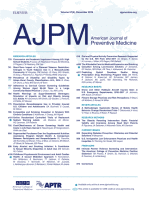
AMERICAN JOURNAL OF PREVENTIVE MEDICINE
Exploring innovative strategies for effective disease prevention.AMERICAN JOURNAL OF PREVENTIVE MEDICINE is a premier publication in the fields of Epidemiology and Public Health, published by Elsevier Science Inc. With a commendable impact factor and ranking within the top quartile for both Epidemiology and Public Health categories, this journal serves as a vital source of cutting-edge research, reviews, and critical insights aimed at promoting health and preventing disease. Since its inception in 1985, the journal has been dedicated to disseminating high-quality articles that inform health policy, improve clinical practices, and enhance community health initiatives. It is readily available to researchers and professionals committed to advancing their knowledge and practice, ensuring the continued evolution of preventive medicine. The journal's reach and influence, underscored by its impressive rankings, position it as an essential resource for those looking to make a meaningful impact in the world of preventive health.